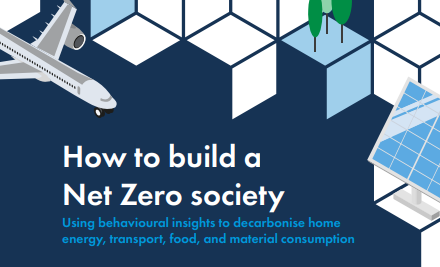British tourists are being evacuated from wildfires on the continent, and meanwhile, our political leaders have been flirting with abandoning or watering down key climate policies. It’s dispiriting, but having studied the behavioural science of climate policy for the last decade, I can’t say I’m surprised.
Let’s remind ourselves, in case our politicians have forgotten – voters want strong climate action. The Government’s data show that 82% of Brits are concerned about climate change, and that’s highest in London (45% ‘very concerned’ relative to 39% nationally). Only 9% oppose Net Zero, and in fact a majority think we should get there before 2050. This isn’t a fad – support has been consistently high going back through multiple Prime Ministers, a cost of living crisis, Covid-19, Brexit, and beyond.
And why not? The truth that Net Zero is a ‘win-win’ feels more relevant than ever. Cheaper bills, greater energy security, warmer homes, cleaner air, new jobs, the economic growth opportunity of the 21st Century, and we’ll save the planet in the process. These things win votes. Backtracking would be a disastrous over-correction.
And yet the rhetoric around London’s ULEZ expansion has highlighted the real challenges we face when it comes to delivery. I’m sure the residents of Uxbridge want to breathe cleaner air, but, like the rest of us, they may be less keen to stump up cash for an electric car, or walk their kids to school.
And there’s more of this to come. 62% of the emissions cuts we need depend on ‘behaviour change’ – mainly the adoptions of green tech like zero-emission cars and heatpumps, but also some modest lifestyle change around walking and cycling, diet, and aviation. Even the other 38% will depend on hard-won public agreement, for transmission infrastructure and wind turbines, for example. It’s all behavioural, and, therefore, politically volatile.
Our data show that 89% would like to make more sustainable choices in their life. But a similar 88% say it’s too often too hard because it’s too expensive, inconvenient, or confusing. That’s why 87% wish leadership from government and businesses was stronger – bold policy, yes, but policy which makes the greener choices easier, more available, more understandable, more affordable.
Public goodwill is there, to a point. Our surveys also show that 61% would be ‘willing to switch to a low emission vehicle in the next year’ – just what the ULEZ asks of them. 72% would be willing to retrofit their home; 69% to take more public transport, 71% to fly less often, even. But being ‘willing’, in principle, is not the same as being happy to pay for it, or undergo great personal inconvenience to achieve it. The Mayor of London faces legal requirements on both national carbon emissions, and local air pollution, so I’m not saying there’s an easy alternative to the vital ULEZ proposals. But as a matter of principle, climate policy needs to remove the trade-offs for citizens, not impose them.
That’s why we need electricity to be cheaper relative to gas (it would favour heat pumps and electric cars – and it’s madness that carbon taxes are applied to electricity but not gas). It’s why we need new labelling systems so that any of us have a hope in hell of working out which pair of jeans, pack of sausages or pension is the greener one. It’s why we need hyper-slick ‘one-stop-shops’ for household energy efficiency improvements, bundling together attractive finance, advice, home surveys, reliable installers and consumer protections.
It’s also why policies like the Clean Heat Market Mechanism (rarely talked about – a point in its favour) have the right approach. A tradeable levy placed on heating manufacturers from 2024, requiring them to meet targets for low-carbon heat pumps vs boiler sales. If they fail to do so, they’ll have to charge more for gas boilers to cover this cost, but that’s not really the point, because it would be a losing business strategy. The market will react, and manufacturers will be drawn to all sorts of innovation – in the product, manufacturing techniques, home surveys, consumer protections and guarantees, installation, pricing and marketing. In short, anything and everything that makes us genuinely want a heat pump instead of a boiler because they’ll be better and cheaper. A true win-win that helps us adopt the right behaviour, without the difficult trade off.
So let’s not back-track. Let’s just get better at policy-making.




